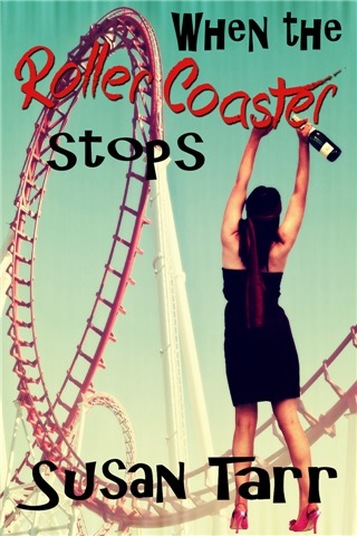
When the Roller Coaster Stops
by Susan Tarr
Although it is 29-year-old Bethany who is diagnosed with colorectal cancer, When the Roller Coaster Stops is as much Kate’s story as it is Bethany’s. And yet, Kate is in the story, in Bethany’s life, almost by accident and frequently, at least initially, against her better judgement.
It is easy enough to sympathise with Bethany as her doctor makes his uncompromising diagnosis, as she rails against her cruel fate and as her health deteriorates. I found it far more difficult to feel any liking for her. For much of the course of her illness – and she is already ill when we meet her in chapter 1 – she is decidedly nasty, catty, manipulative … and vain. Although others tell Kate how kind, funny, intelligent and generous Bethany is, being nice is something that Bethany is forced to learn: a trait that she eventually masters in the novel’s final chapters.
Kate is Bethany’s opposite in every way. In her mid-thirties, Kate is shy and serious, a little unworldly and, luckily for Bethany, Kate really needs a job. Taken on by Bethany as a casual cleaner, Kate finds herself becoming Bethany’s housekeeper, driver, carer and most importantly, confidante and much loved friend. After several unsuccessful attempts to give Bethany her notice and escape from her jibes, Kate learns to stand her ground, to face up to Bethany and to recognise her own worth. Throughout the book, Kates grows stronger, more determined and more confident as Bethany’s illness worsens.
A handful of complicated friends cluster around Bethany and through the times that they spend chatting together, Tarr has explored such issues as abortion, adoption, jealousy, coming to terms with a friend’s imminent death and so on. These sometimes quite boisterous evenings and dinner parties inevitably come to an end, the guests go home and it is Kate who is left to clean up and to cope day after day, week after week, with Bethany’s mood swings and sudden whims: her sorrow and misery and unexpected - and short-lived - bouts of euphoria. At the same time she is a buffer between Bethany and some of Bethany’s less welcome visitors and also a shoulder to cry on for the friends who really love Bethany.
In this respect, When the Roller Coaster Stops is a very worthwhile handbook for any untrained friend or family member who is to be a loved one’s carer during a terminal illness. Tarr has kept the medical details to a minimum, meaning that Bethany’s journey through her cancer is far from colorectal-specific. Much of what Kate learns to deal with can be just as well applied to someone caring for and living with a patient with any other type of cancer. There are no truly gory details and often there is wittiness and laughter; serenity and contentedness. The language is uncomplicated: a sad situation is recounted without using an overly emotional register. Tarr lets her descriptions of the winter weather convey the down-beat sentiments of Bethany, Kate, Simon and George. The novel is set in Wellington, New Zealand, but in such a low key way that it could be almost any coastal city in the world.
I would have liked to see the aspect of Bethany’s genetic make up and its relationship to colorectal cancer explored in more detail. A little less bickering and sobbing in the Bethany-Simon-George triangle would tighten up the story’s pace too, but these two points apart, I feel that Tarr has very competently and sensitively dealt with the path of terminal illness from the intertwined view points of patient, carer and friends.
Author: Susan Tarr
Publisher: Susan Tarr
ISBN: 9781515055082
Available: print within NZ, message via https://www.facebook.com/susan.tarr.330; print or ebook via https://www.amazon.com/dp/B0125U3DVK/

 RSS Feed
RSS Feed
